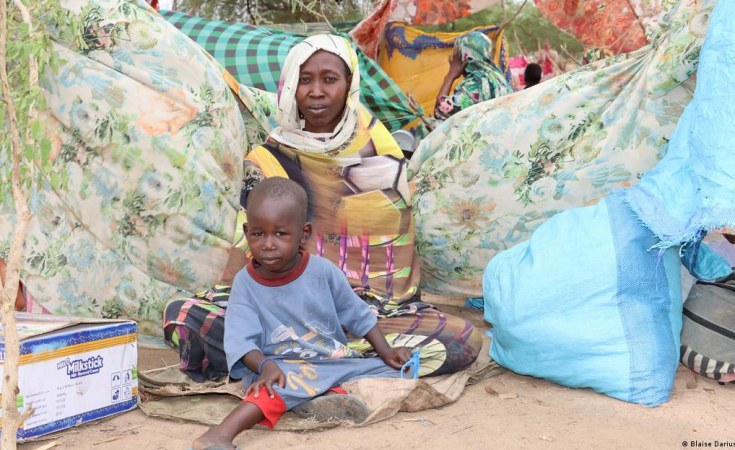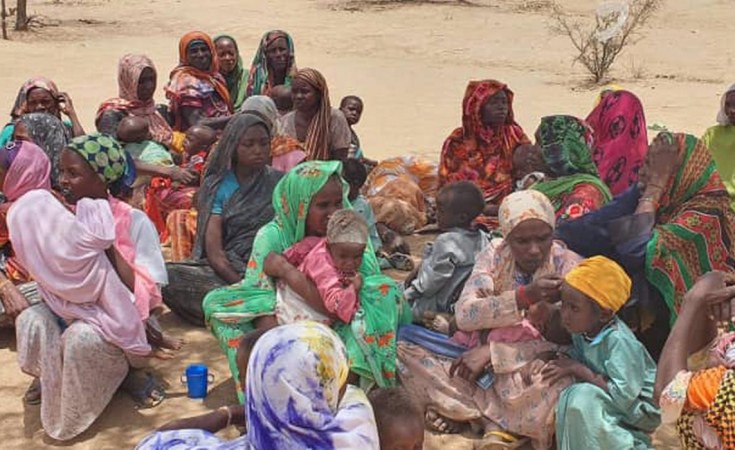As Sudan's warring generals make and break ceasefire agreements, tens of thousands of people continue to flee the country. People from the violence-stricken Darfur region in particular seek help -- and hope -- in Chad.
Bornon Khamis Haroun remembers the nice things she had: A lovely home with pretty mats and her own bed to sleep on. And then overnight, her country, Sudan, turned into a warzone, forcing the 25-year-old to flee.
Just over a month after heavy fighting broke out across Sudan, Haroun gathered her five children and left her hometown of Kanga Haraza, a village in West Darfur. They walked for two days to cross the border into Chad with nothing but the clothes on their backs.
The shelter at a camp in Borota, a village in the hot and arid eastern Chad region, is a far cry from the life the family had known before. The structure is made up of nothing more than tree branches dug into the ground, covered with colorful fabric. At best, it can be described as a tent.
Sitting in her new home, Haroun opens up. "My husband was killed," she says tersely. "In the bush. He went to look for firewood and he got killed."
Another Darfur crisis
Haroun and her children are just a few of hundreds of thousands of people who were forced to flee Sudan into neighboring countries. Some 259,000 people have fled the country since the fighting began, according to the UN's migration agency, and a further 1.8 million people have been internally displaced in Sudan.

The fighting between the heads of the Sudan Armed Forces (SAF) and the paramilitary Rapid Support Forces (RSF) has turned into a humanitarian crisis despite a fragile truce signed last week. That truce is now set to expire on Monday night.
Much of the fighting between the two factions has raged around the Sudanese capital Khartoum as well as the Darfur region, which is where most people escaping to Chad, like Haroun, come from. A restive region, Darfur was still reeling from its violent past when the civil war began in April.
Hundreds of thousands have been killed in Darfur since 2003, when Arab militias first turned on non-Arab populations to suppress a rebellion against Sudan's former dictator Omar al-Bashir.
But with the recent surge in violence, Darfur has once again become a crisis hotspot. The UN says that at least 96 people have died in West Darfur state alone, as militiamen were reported looting and destroying entire villages.
Limited resources
Compared to others, Haroun is a recent addition to the camp in Borota. Women and children have been streaming across the border since fighting in Sudan started.
Haroun is not yet registered at the camp, and so she cannot receive food aid. For now, she has to rely on the generosity of her neighbors, who themselves have very little.
Aid agencies say that at least 60,000 Sudanese people are now in Chad alone, many of whom are yet to register. The Borota camp is currently the biggest of a network of camps, where more than half of these new arrivals reside.

Resources for people like Haroun are limited; there is a well which was dug by aid agencies to provide water to these refugees but it is always crowded there. Women cook meager meals over open fires in front of their improvised tents.
Elsewhere, the conditions are even worse.
Chadians also suffering
Among those seeking safety in Chad are Chadian nationals, who for many years lived in Sudan. Since they originally come from Chad, they are not classified as refugees, as the majority of humanitarian help is focused on Sudanese refugees.
At a camp in Tomtoma village several hours away, some 7,000 returnee Chadians are trying to get by. A fast-drying well is their main source of water and food aid is slow to come.
Recently, a mobile clinic opened but is tightly packed with mothers seeking malaria treatments for their children.
Despite the dire conditions, many say they won't return to Sudan as long as there is no peace.
"My only wish is that they help us settle here permanently," says Sadie Idja, a mother of three. "What's happening is horrible."
Refugees upon refugees
Bachiaka Singare, a coordinator with the World Food Program, says that there were severe funding shortfalls even before the civil war and these are now affecting the current situation.
"I think it's one of the most urgent crises right now, where you really have to be sensitive as to where you deploy the means. Otherwise lives will be at risk," Singare says. "And right now, we don't even have the means."

Since the Darfur crisis first began two decades ago, refugee camps have sprung up across Chad. They hold some 400,000 refugees by now, many of whom are still almost exclusively reliant on aid.
Those camps have long been semi-permanent settlements, which remain underfunded.
Between life and death
Catching up with the funding gap won't be easy, as Chad's ability to take care of people fleeing the violence in Sudan keeps shrinking.
Singare says that above all, as more and more people are trying to escape the conflict, new locations with proper housing infrastructure need to be established in more secure areas.
He highlights that the camps in Chad are positioned so close to Sudan that refugees have been going back and forth to collect their personal belongings from the same volatile villages which they fled in the first place.
Last week, one such refugee who ventured back across the border into Sudan was killed, an aid official, who was not officially authorized to speak to media, told DW News.
Haroun says she will focus on rebuilding her life, despite the difficulties ahead.
"The war has driven me away from my home," Haroun says, her voice breaking.
She wipes away her tears and admits: "I don't know what to do."
Blaise Dariustone contributed to this article
Edited by Sertan Sanderson


